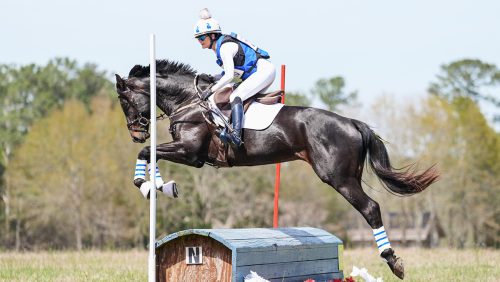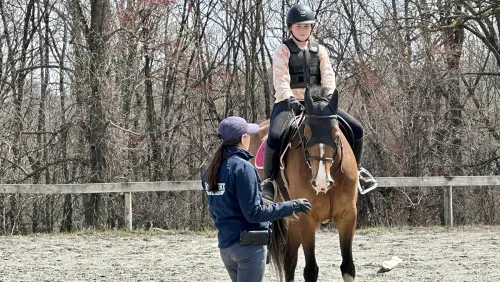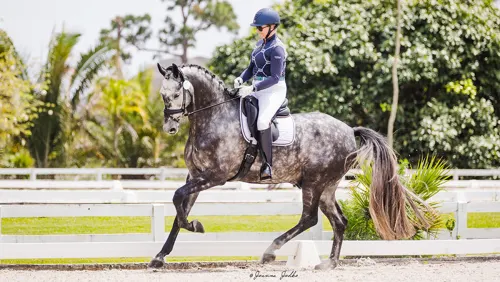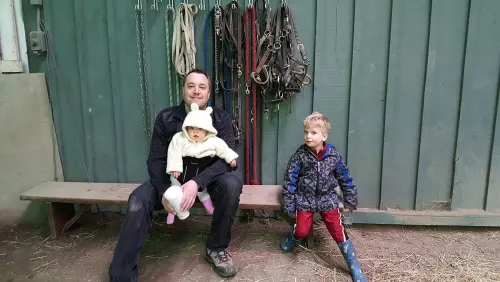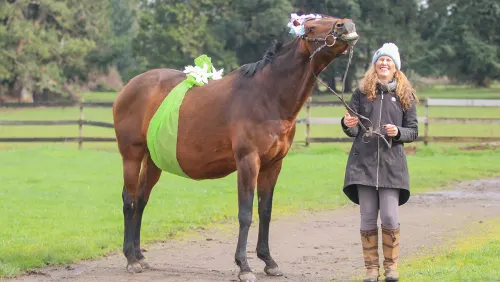When I was 9, my parents finally allowed me to start riding lessons. This happened after a year of begging them for lessons, going to my best friend’s barn with her, and learning everything I could about horses to prove my desire to learn how to ride. Most horse-crazy kids who continue riding into adulthood have a deep-rooted love for horses. It’s just impossible to imagine life without them.
The first trainer I rode with was very old school. She didn’t allow students to start riding until they knew the basic parts of the horse and how to groom properly. All of her students were required to clean their horse’s stall either before or after riding. If it wasn’t done correctly, we started over. While she was strict, the fundamentals of horsemanship have stayed with me.
Throughout my riding career, I have ridden lesson horses, other people’s horses and paid for a couple half leases. While my family couldn’t afford to buy me a horse as a kid or teen, they always supported my riding and paid for shows and lessons with excellent trainers.
I fell off lesson horses, broke bones, got stepped on. Fingers were bitten, horses took off with me. At times, my parents wondered when I would have enough and quit riding, but that day never came. For every hard time, I experienced twice as many positive, wonderful things. I studied how the horses interacted with one another, how forgiving many of them were when a riding mistake happened. Feeling a horse press its soft nose into the palm of my hand, how we worked as a team in lessons, and the overwhelming sense of safety with them overcame any hard experiences. Being an equestrian taught me about both strength and gentleness, preparing me for something unforeseen in my future.
On a clear Florida day in May just a few months before my 17th birthday, I had a terrible riding accident. My trainer asked me to do the outside line one more time and to work on improving our rhythm between the jumps. The first jump came right out of stride beautifully, and we floated down the line. After the second jump, the horse tripped to the point that his face was in the dirt. I thought I was going to flip over his head. He somehow recovered, but his hoof was on the side of his face as he regained balance, ripping the bridle off mid-canter. I sat back, said whoa, and felt him slow nearly to a trot before the bridle, which was still attached by the standing martingale, hit him in the legs. He looked back at me, terrified, before taking off. The trainer screamed at me to jump off. I had no other choice. I took my feet out of my stirrups and pushed off his side, but his momentum carried me beneath him, where I was trampled before I lost consciousness.
It was a freak accident and nobody’s fault, but that fall and subsequent serious acute illness triggered the hidden chronic illness in my body to activate. About a month after that riding accident, I caught several viruses and infections. My body felt foreign to me. I couldn’t walk unassisted or hold a hairbrush or even cut my own food. My joints became hot, red and swollen. I had a fever of 101-103 degrees and a migraine for months. Clothes felt like needles against my skin. A couple of months later, I was hospitalized for what turned out to be three different infections, two of which had gone into my brain, causing it to swell. I promised myself, during the first of what would be many hospitalizations, to never give up. I have kept that promise, even though it often feels impossible.
ADVERTISEMENT
When I was healed enough to go to the barn, I went to check on the horse I fell off of. He had this little star on his face that he loved having scratched. I stood there with him and cried and scratched his star. I told him it wasn’t his fault, I wasn’t mad, and I was sorry it happened. He sighed.
Once active, autoimmune diseases often remain mysterious and hard to diagnose. Mine wasn’t accurately diagnosed as rheumatoid arthritis and treated properly for about a decade. In fact, it’s not uncommon for people with autoimmune diseases to not know they have them for many years until something, trauma or illness or both, opens the door for the disease to activate. Autoimmune diseases like RA are disabling conditions where your body mistakes healthy cells for invaders and attacks itself. Autoimmune diseases are systemic, affecting the entire body—organs, joints, tissues. Anyone at any age can develop an autoimmune disease, including young children.
These diseases take away so much of what makes a person feel whole. While some of this is temporary, many parts of your previous life are permanently gone. No amount of believing or hoping can bring back the old you, the things that made your life yours, the health you once enjoyed freely.
But having a disease like I do and being a person living with a disability doesn’t mean you are any less you. It doesn’t mean you can’t enjoy living your life and finding ways to do the things vital to your life and happiness. For a while I had to slow down how often I rode, leading to months of no riding at all. With all autoimmune diseases, there are times of intense disease activity or flare-ups and times of remission, even when treated properly.
I knew without any doubt that I would ride again. As my rheumatologist says, “Horses are vital to your life and partly how I measure the success of your treatment plan. You must ride. It’s your life’s blood.”
Horses helped prepare me for a life of managing a chronic, disabling condition. They helped make my body physically strong, gave me an unwavering sense of self, taught me to listen closely, how to gently care for wounds, and to be persistent in my will to live. In fact, during some of my most intense medical moments, including surgeries, heart procedures and unpleasant tests, I would dream of horses coming to me, carrying me away from the pain or fear. Their soft noses pressed against me, as if they were in the room.
ADVERTISEMENT
Even though my body often struggles still, I work hard to manage it. I must balance the time I spend in the saddle with enough rest, which sounds deceptively simple. RA causes daily pain and fatigue. Riding still hurts, but not like it did before proper treatment. My trainer works with me to achieve my riding goals without pushing my health too far. My husband and family support my horse dreams, and for the first time in my life, I am a horse owner.
This year, I purchased Jet from my trainer. He’s a 17-hand, dark bay off-track Thoroughbred with a funny, sweet personality. My trainer began retraining him a year before I bought him. I watched him develop over the past summer when I was on a medical leave because of the illness. I could sit at the barn and be around horses. Sometimes even the smallest happiness is enough to keep you motivated. Though still young and green, Jet is kind and forgiving when I make a mistake, and he always tries. Owning my own horse has been a dream since I was a child, and it’s one that I had started to believe would never happen.
People have asked me often, “Why do you still ride? Aren’t you afraid you will fall off again and get hurt again? Aren’t you worried about your RA?”
I answer, “Yes, I worry about my RA, my heath, falling off, getting hurt, but I refuse to live my life in fear of everything. Horses make me happy.”
Jet and I are working towards showing in hunters and equitation soon, and eventually moving up to the amateur-owner division and showing at 3’3”-3’6”. I finally have my horse, and together we will fly.
Phoebe Brown, 33, is a Florida native who has spent most of her life in the saddle, riding and showing in the hunter/jumpers. She earned a Master of Fine Arts in creative writing from the University of Tampa. She writes poetry and creative nonfiction and hopes her work can help others dealing with loss, illness and trauma. Her work has appeared in several literary magazines, including Hoot Review, Deep South Magazine and The Healing Muse.










